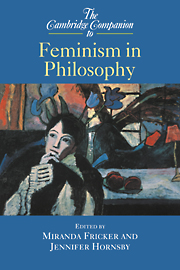Book contents
- Frontmatter
- Introduction
- 1 Feminism in ancient philosophy
- 2 Feminism in philosophy of mind
- 3 Feminism in philosophy of mind
- 4 Feminism and psychoanalysis
- 5 Feminism in philosophy of language
- 6 Feminism in metaphysics
- 7 Feminism in epistemology
- 8 Feminism in epistemology
- 9 Feminism in philosophy of science
- 10 Feminism in political philosophy
- 11 Feminism in ethics
- 12 Feminism in ethics
- 13 Feminism in history of philosophy
- Further reading
- Index
11 - Feminism in ethics
Conceptions of autonomy
Published online by Cambridge University Press: 28 May 2006
- Frontmatter
- Introduction
- 1 Feminism in ancient philosophy
- 2 Feminism in philosophy of mind
- 3 Feminism in philosophy of mind
- 4 Feminism and psychoanalysis
- 5 Feminism in philosophy of language
- 6 Feminism in metaphysics
- 7 Feminism in epistemology
- 8 Feminism in epistemology
- 9 Feminism in philosophy of science
- 10 Feminism in political philosophy
- 11 Feminism in ethics
- 12 Feminism in ethics
- 13 Feminism in history of philosophy
- Further reading
- Index
Summary
Feminist ethics
Ethics, or moral philosophy, as a field of intellectual inquiry developed in the west for well over two thousand years with minimal input from women. Women's voices have been virtually absent from western ethics until this century, as they have been from every field of intellectual endeavour. The absence of female voices has meant that the moral concerns of men have preoccupied traditional western ethics, the moral perspectives of men have shaped its methods and concepts, and male biases against women have gone virtually unchallenged within it. Feminist ethics explores the substantive effect of this imbalance on moral philosophy and seeks to rectify it.
Like other areas of feminist thought, feminist ethics is grounded in a commitment to ending the oppression, subordination, abuse and exploitation of women and girls, wherever these may arise. In the late 1960s, when feminist ethics began, it consisted mainly of applying the resources of traditional moral philosophy to the array of moral issues that were being brought to public attention by the women's movements then arising in many western societies.
- Type
- Chapter
- Information
- The Cambridge Companion to Feminism in Philosophy , pp. 205 - 224Publisher: Cambridge University PressPrint publication year: 2000
- 35
- Cited by

